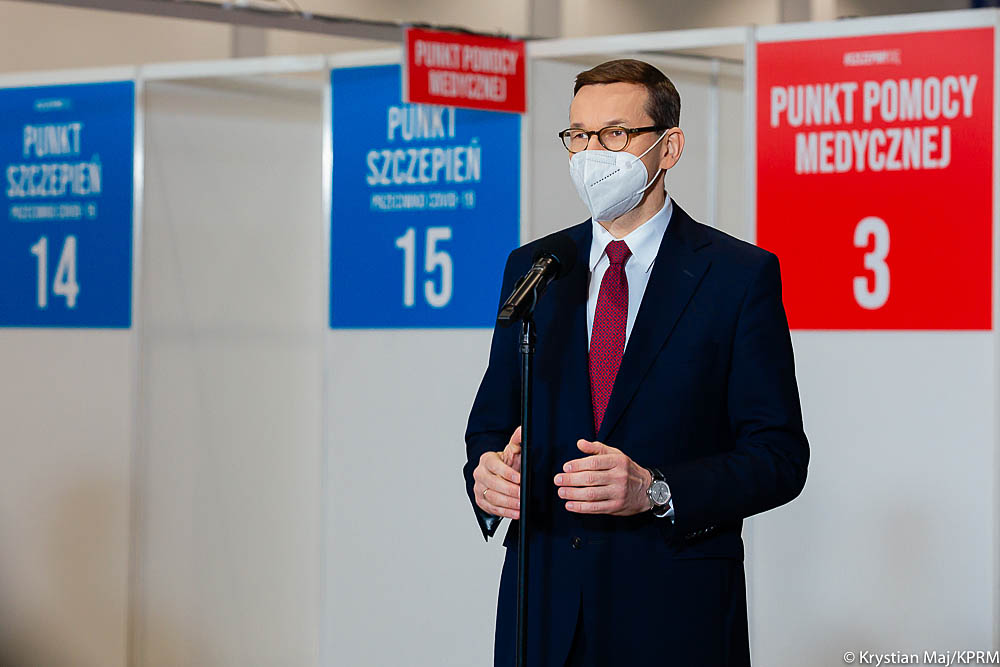Poland’s government has announced plans to shorten the amount of time people receiving COVID-19 vaccinations will have to wait for their second dose. The waiting time for all will now be equalised at five weeks.
People who have recently recovered from coronavirus will also not have to wait as long before being eligible for vaccination, and the government says it will shortly launch a drive to persuade more people to vaccinate.
Speaking at a press conference this morning, Michał Dworczyk, the government minister responsible for overseeing the national vaccination programme, said that the time between the first and second Moderna, Pfizer and AstraZeneca jabs would be cut to five weeks for people registering from 17 May.
“In conjunction with the position of the Medical Council [which advises the prime minister on Covid policy], we have made the decision to shorten the period between administering the first and second dose,” said Dworczyk, quoted by Gazeta.pl.
Second doses should now be given around 35 days after first doses. For Moderna and Pfizer vaccinations, the new recommendation is just one week less than it was previously. But for AstraZeneca, the gap will be more than halved – from around 12 weeks to just five.
“In terms of safety and health, everything is being done in accordance with the producers’ rules and guidelines,” Dworczyk emphasised. Poland also uses Johnson & Johnson vaccines, but they require only one dose.
There have recently been reports of low uptake and consequent high availability for AstraZeneca vaccines. One purported reason is the much longer waiting time for the second dose.
This vaccine, which was widely used in Poland in the early months of the vaccination rollout, including for schoolteachers and academics, has also often received a bad press over concerns about potential blood clots as well as perceived lesser efficacity.
In March, there were reports that many AstraZeneca appointments were being missed in Poland as a result. Last month, the Catholic church in Poland alsoexpressed “serious moral objection” to the AstraZeneca and Johnson & Johnson vaccines because they were produced using material derived from aborted foetuses.
In a further change, from 17 May people who have recently been infected with coronavirus will be able to register for vaccination just 30 days after their positive test. Currently, they are able to do so after 90 days.
Dworczyk added that the “biggest challenge” would soon change from being the availability of vaccines to convincing everyone to take advantage of them. He announced that a promotional campaign with this objective, featuring sportspeople, bloggers and celebrities, is to start in mid-May.
Already today, a new video shared by the prime minister’s Twitter account features the popular actor Cezary Pazura encouraging people to vaccinate against coronavirus.
💉 Nawet prawdziwy Kiler nie boi się szczepienia ❗️
➡️ Zarejestruj się na: https://t.co/qNHvFwj7mw pic.twitter.com/sOThcou50J
— Kancelaria Premiera (@PremierRP) May 10, 2021
As of Sunday, everybody living in Poland aged at least 18 can register for vaccination, and Dworczyk said that a decision on 16 and 17-year-olds will be taken this week. Around 31 million adults have received a referral for vaccination, he added.
That means that almost one third of people have received at least one dose – just over 10 and a quarter million, according to this morning’s data. Some 3.67 million people are now fully vaccinated – either having received two doses or the single-dose Johnson & Johnson jab.
With vaccinations rising and infections falling, the government has been gradually removing its coronavirus restrictions. The health ministry today confirmed that the timetable could be accelerated.
Main image credit: Krystian Maj/KPRM (under CC BY-NC-ND 2.0)

Ben Koschalka is a translator, lecturer, and senior editor at Notes from Poland. Originally from Britain, he has lived in Kraków since 2005.




















